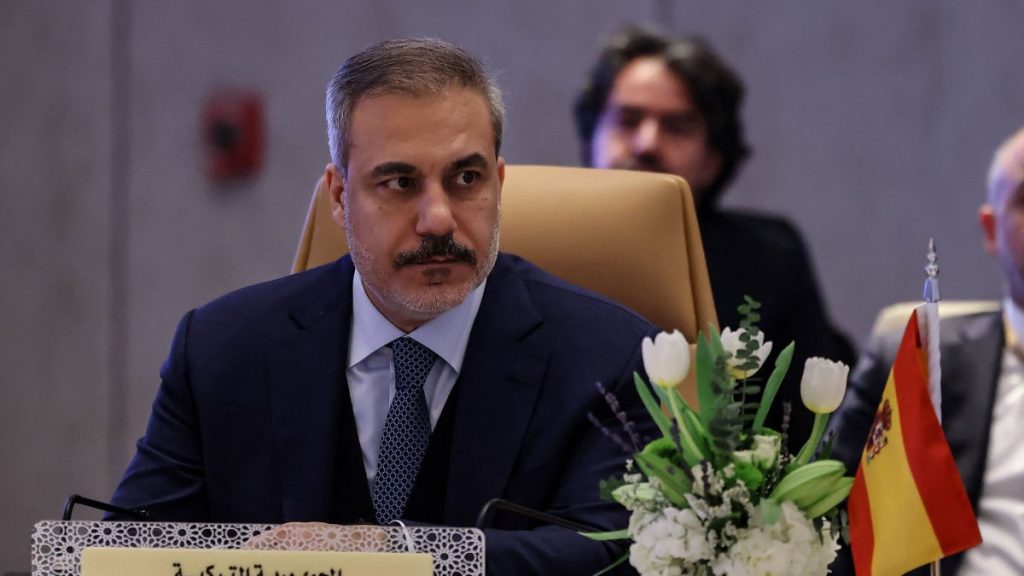Turkish Foreign Minister Hakan Fidan attended a meeting on Syria hosted by Saudi Arabia on Sunday. His counterparts from European countries, the Arab League and Syria’s new foreign minister were among the meeting participants in Riyadh.
Before the main meeting of all ministers and representatives began, Fidan spoke at a meeting of Arab League ministers and highlighted that regional countries had a responsibility to steer the developments in Syria in the right direction.
“As Türkiye, we are ready to help the people of Syria in this difficult path forward,” Fidan underlined. He also called for more international cooperation to achieve this.
Fidan said the participation of new Syrian Foreign Minister Asaad Hassan al-Shaibani in the meeting was a historical moment and a turning point.
He noted that their basic principles to assist Syria was based on Syria’s territorial integrity, unity and sovereignty, adding that “normalization signals in Syria have been growing every day.” “In this critical period, we have to act as a balancing power maintaining a cautious balance between the facts that Syria’s new administration faced and expectations of the international community,” he stated. He underlined that a cooperation mechanism or committees could be founded for more efficient efforts, and countries should determine sectors that should be prioritized in exemption from sanctions in place against Syria. Western powers, including the United States and the European Union, imposed sanctions on Assad’s government over his brutal crackdown on anti-government protests in 2011, which triggered civil war. They now pursue a wait-and-see policy to lift the sanctions after the Assad regime was toppled by anti-regime forces as the transition period in Syria takes shape.
The minister also voiced one of Türkiye’s main concerns regarding its neighbor Syria, which is the terrorist group YPG, the Syria wing of PKK that carved out a self-styled autonomous region for itself in the northeast, immediately across the border with Türkiye. Fidan said their main focus would be the preservation of Syria’s territorial integrity and called “SDF” (the name of the umbrella group in northeastern Syria led by YPG) to announce its dissolution “if it is sincere in its efforts for integration with Syria’s central administration.”
Fidan said that the terrorist group posed a serious threat to the Arab-majority population in the east of the Euphrates River, where it controlled several regions and continued looting natural resources Syria needed most right now. PKK/YPG occupies more than 70% of oil fields in Syria, according to a report by Anadolu Agency (AA). Through domestic sales of oil and imports, it earns about $2.5 billion annually. The report says the group both legitimately sells the oil and smuggles it. Among the largest oil and gas fields occupied by the group are those in Deir el-Zour and Hassakeh. Syria’s oil reserves are concentrated in the northeast.
In the fight against the terrorist group Daesh, Fidan said they could work together with the Syrian administration to boost its counterterrorism capacity. The PKK/YPG receives military support from the United States and other Western countries under the guise of fighting Daesh, despite protests from Ankara. Türkiye says the YPG/PKK is on par with Daesh and should have no presence in the new Syria.
Last Friday, Fidan ruled out a role for French troops in Syria, saying it was only negotiating with the U.S. Fidan’s statements followed a call by the PKK/YPG for France to set up a secure zone in Syria for them and French President Emmanuel Macron’s pledge not to abandon “Kurds” in reference to the terrorist group. Fidan said on Friday that France turned a blind eye to their security concerns and they should better focus on taking back French Daesh members jailed in Syria. Türkiye also repeatedly warned that it might launch a cross-border military offensive to eradicate the PKK/YPG if the latter do not heed their call for dissolution.
Hakan Fidan was the highest-ranking Turkish official to visit Damascus after the fall of the Assad regime and met the country’s de facto leader, Ahmed al-Sharaa, on Dec. 22, 2024. al-Sharaa himself is expected to visit Türkiye soon.
Türkiye backed the Syrian opposition against Assad when the civil war broke out in 2011. The war displaced millions, and many among them fled to Türkiye, where they lived as refugees for years. In the last year of the war, Türkiye pushed for normalizing ties with the Assad regime, though to no avail. When the Baathist rule of Assad ended in December, Ankara called it a revolution.
Calling for a peaceful transitional period and an inclusive government, Ankara has since led the diplomatic efforts to help Syria regain its normalcy and ensure stability in neighboring countries where developments directly affect Türkiye.
President Recep Tayyip Erdoğan has vowed to help the new Syrian administration form a state structure and a new constitution as the country looks to rebuild after 13 years of civil war. Energy cooperation is also on the table, especially in terms of potentially transmitting electricity to ease power shortages.
Ankara also says it trusts al-Sharaa’s administration in the fight against terror groups in Syria, namely the PKK/YPG. Al-Sharaa has said earlier that his administration would not allow the country to serve as a base for the terrorist PKK/YPG and reiterated that Syria must remain united.


